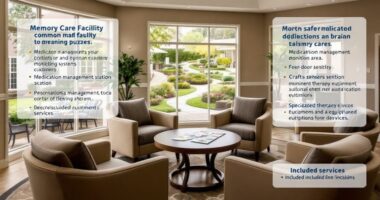Memory care delivers thorough support through skilled nursing staff providing 24/7 supervision and assistance with daily activities. You'll find personalized care plans based on cognitive assessments, medication management, and therapeutic programming including memory games, music therapy, and social interactions. Facilities feature specialized environments with secure outdoor spaces, monitored walking paths, and adapted living areas that remove hazards. Understanding the full scope of services will illuminate the extensive support available for cognitive care needs.

Memory care services represent a specialized healthcare paradigm designed to address the complex needs of individuals experiencing cognitive decline, with an estimated 5.8 million Americans currently requiring such specialized support for conditions including Alzheimer's disease and other forms of dementia.
As cognitive decline affects millions of Americans, memory care services emerge as vital healthcare solutions for those facing dementia and Alzheimer's disease.
You'll find these services delivered through dedicated facilities, specialized wings within assisted living communities, or adult day care centers, each offering extensive care protocols developed by multidisciplinary teams comprising physicians, nurses, and social workers.
Your loved one will receive a meticulously crafted personalized care plan, initiated through thorough cognitive and physical assessments that evaluate their specific needs, preferences, and daily routines. Diligent staff members ensure medication management for all residents, preventing errors through careful monitoring of timing and dosages. These plans undergo continuous modification to accommodate the progressive nature of memory-related conditions, ensuring superior care delivery as your family member's needs evolve.
The implementation of these plans involves skilled nursing staff, including Certified Nursing Assistants (CNAs), Licensed Practical Nurses (LPNs), and Registered Nurses (RNs), who provide round-the-clock supervision and assistance with activities of daily living. Each resident can personalize their living space with family photos and mementos to create a familiar, comforting environment. Staff members receive specialized dementia care training to effectively manage challenging behaviors while maintaining residents' dignity.
You'll observe that memory care facilities integrate sophisticated therapeutic programming, including evidence-based cognitive stimulation activities such as memory games, music therapy, and structured social interactions. These interventions are strategically designed to maintain cognitive function and delay symptom progression while promoting emotional well-being through arts, crafts, and reminiscence therapy sessions.
Physical activity protocols, including modified exercise programs and supervised walking sessions, complement these cognitive interventions.
The therapeutic environment you'll encounter in memory care facilities incorporates specialized design elements that address safety concerns while promoting independence. These features include secure outdoor spaces with monitored walking paths, structured environments designed to minimize confusion, and adapted living spaces that remove potential hazards while maintaining a homelike atmosphere.
Each facility provides common areas that facilitate social engagement while ensuring continuous monitoring by trained staff members who possess specialized dementia care certifications and understand the unique challenges associated with cognitive decline.
Frequently Asked Questions
How Much Does Memory Care Typically Cost per Month?
You'll encounter significant cost variations for memory care across the U.S., with the national median at approximately $6,450 monthly.
Your expenses typically range between $4,000 to $7,000 per month, though costs can reach $15,000 in premium facilities or high-cost regions.
Vermont represents the highest state average, while South Dakota offers the lowest rates, with geographical location and care level substantially impacting your final costs.
Can Residents Bring Their Own Furniture to Memory Care Facilities?
You can bring select personal furniture to memory care facilities, though restrictions apply based on room dimensions and safety protocols.
Most facilities allow meaningful items like a favorite chair or small dresser while adhering to spatial limitations and facility-specific regulations.
You'll need to assess the room's layout during a pre-move visit and confirm with administrators which items comply with their safety standards regarding tripping hazards and space management.
What Is the Staff-To-Resident Ratio in Memory Care Units?
Staff-to-resident ratios in memory care units typically range from 1:5 to 1:8 during daytime hours and 1:10 to 1:15 during overnight shifts.
You'll find these ratios vary based on residents' acuity levels, facility size, and state regulations.
During peak care times, such as morning routines and evening changes, you'll observe higher staffing levels to guarantee proper assistance with activities of daily living and safety monitoring.
Are Pets Allowed to Visit Residents in Memory Care?
Most memory care facilities allow pet visits under strictly regulated conditions that prioritize resident safety and health protocols.
You'll need to guarantee your pet has current vaccinations and health certificates before visiting.
While permanent pet residency isn't typically permitted due to cognitive care requirements, supervised therapeutic animal interactions are encouraged, as research indicates they can reduce anxiety and depression among residents with dementia.
Staff will coordinate visiting schedules and designated interaction areas.
How Often Can Family Members Visit Loved Ones in Memory Care?
You can visit your loved ones in memory care facilities seven days a week during designated hours, typically between 10:30 a.m. and 7 p.m., with visits generally limited to one hour per session.
While walk-in visits are permitted, facilities monitor visitor capacity and restrict visits to two visitors per resident simultaneously.
It's recommended to call ahead to verify visit status and confirm your loved one's schedule, particularly during health-related restrictions.









